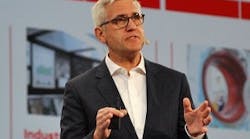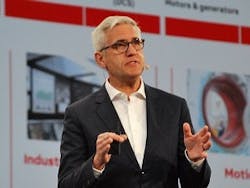“Our ambition is to serve our customers in moving up the curve of applying digitalization technologies, making them more competitive, and driving their safety and productivity." ABB CEO Ulrich Spiesshofer delivered the keynote address at this week’s ABB Customer World 2019 in Houston.
A little help from your friends is always welcome, but when you're trying to get by—and even thrive—in the fast-changing world of digitalization and Industry 4.0, help from friends like ABB and Hewlett Packard Enterprise (HPE) can make all the difference.This was the message delivered by ABB CEO Ulrich Spiesshofer and HPE CEO Antonio Neri in their keynote addresses to a standing-room-only audience representative of the more than 10,000 attendees registered to attend this week’s ABB Customer World conference in Houston.
After showing a video of ABB's YuMi robot conducting Andrea Bocelli and the Lucca Symphony in Pisa, Italy, Spiesshofer reported, "Ten years ago, I'd have said this was impossible, but our technology combined with artificial intelligence is amazing: we taught YuMi to conduct this piece in just 17 hours.
"ABB has been a technology pioneer for all of its life, and this is another example of how we can help our customers write their own futures. In the 19th century, we helped bring electricity and motors to the world; in the 20th century, we were the first to bring industrial robots to North America in 1974; and now we're enabling the 4th Industrial Revolution, helping our customers write their futures with solutions like ABB Ability, which was introduced two years ago and is rocking the automation world."
HPE’s Neri added, “It’s incredible how everything all around us is being digitalized. Things are being securely connected from the edge to the cloud in new architectures that are allowing intelligence to be embedded everywhere. The future will be edge-centric, cloud-enabled and data-driven. Last year, we pledged the invest $4 billion over the next four years to develop these solutions.
"However, no one can develop all these solutions alone. We all need partners, which is why HPE has partnered with ABB. We've already made big strides. In fact, less than a year into our partnership we announced our joint hybrid IT solution."
Active on all fronts
Spiesshofer added that ABB is further helping its customers shape their futures by maintaining its strong distributor relationships, and by preserving its pioneering technology leadership with active portfolio management, exemplified by its acquisition and integration in recent years of Thomas & Betts, Baldor Electric, B&R and others.
"However, we didn't just go shopping," he said. "We're also now the leader in electric vehicle (EV) charging in the U.S., and are partnering with HPE on data centers. We've invested $14 billion since 2010 on R&D and many other ways to help our customers. And since 2014, we've been focused on making each of our businesses the global leader or a close second in their fields."
To further enhance its leadership in the accelerating digital industries, the company also announced three major initiatives characterizing "the new ABB" at the beginning of 2019, including:
-
Focus on digital by divesting its power grids division to its partner Hitachi, which will complete assuming ownership by 2020. This division has $10 billion in annual revenues in a $90 billion global market, and offers high-voltage products, grid integration, grid automation and digitalization, and transformers.
-
Simplify the ABB business model and structure with four streamlined, entrepreneurial business channels, all served by the ABB Ability platform. "We listened to our customers, who said we were often too complex and difficult to deal with, and have greatly simplified our structure with better customer focus, higher speed and fewer interfaces," said Spiesshofer. As part of the restructuring, some 90% of the company’s former corporate functions are being distributed out into the four customer-facing businesses.
-
Continue to advance the leadership position of the four remaining ABB businesses—electrification, industrial automation, motion, and robotics and discrete automation—each of which already ranks as global leader or strong number two in their respective domains.
"The new ABB is working with you to make you more effective," added Spiesshofer. "This is our future as a pioneering technology leader in the digital industries. We're well-positioned to help out customers succeed in Industry 4.0."
AI aids automation
Spiesshofer reported that ABB and its customers will be assisted in their future-focused efforts by artificial intelligence (AI) as it begins to supplement classic industrial automation. "There are all kinds of opportunities for AI to help with effectiveness and safety, and our technologies are well-positioned to take the next step, whether it's by enabling humans and robots to collaborate and make their companies more competitive, or by driving other positive labor changes," he explained.
"The U.S. still only has 40,000 installed robots, so there's a big opportunity to have them help with reshoring and bringing manufacturing back to the Americas,” Spiesshofer said. “Of course, AI can also help with mobility and the long-range EVs coming soon, which is how ABB will be writing the future again."
Spiesshofer added the three pillars of the new ABB's success include: unique and leading portfolio in the digital industries, its solutions-oriented business model, and pioneering innovation leadership. "As we've shaped our portfolio over the past 10 years, no other company can offer the combined electrification, automation, robotization and digitalization that we can," he added. "This will be very helpful to our customers as they do Industry 4.0 projects and operations."
The backbone for many of these efforts will be ABB's deep domain expertise and its ABB Ability common platform with specific capabilities, which can be deployed from devices, up through gateways, and onward to cloud-based platforms like Microsoft Azure. The cloud level will be aided by ABB's cybersecurity, digital twin, app marketplace and inter-cloud capabilities.
ABB Ability projects recently deployed recently include:
-
New EVgo fast-charging DC stations that use ABB Ability for 24/7 diagnostics and predictive maintenance, as well as supporting future long-range EVs;
-
Electric power utility Ameren in Illinois, which deployed ABB Ability's Ellipse asset performance module (APM) in the course of a grid modernization project to increase power reliability for more than 1 million customers;
-
Oil and gas leader Equinor (formerly Statoil), which used ABB Ability to better integrate automation and collaborative operations, achieving 98% fewer manual steps and faster startup; and,
-
German automotive supplier Koki, which employed ABB Ability Connected Services to achieve 25% fewer downtime incidents and 60% faster recovery.
"Our ambition is to serve our customers in moving up the curve of applying digitalization technologies, making them more competitive, and driving their safety and productivity," said Spiesshofer. "ABB Ability is the common platform that can help them, and AI will further democratize data to assist some of our customers that may not have as much expertise to apply these tools as other high-tech users."
Partnerships proliferate
Spiesshofer also announced that ABB entered a global partnership last week with Dassault Systemes to enhance the software-based digital twins that customers are using to enhance their design and build operations, as well as accelerate their shift from mass production to mass customization. These tools will be used in smart factories and robotics, smart buildings and the process industries.
Similarly, the company’s partnership with HPE is enabling ABB to meets the needs of customers, who want the benefits of cloud-based computing, but don't want to risk putting their systems on a public cloud. "This is why we found a partner in HPE that could implement onsite data centers," added Spiesshofer. "It's one of the ways we’re shaping ABB to be the technological leader in digitalization. And as your partner of choice in electrification, automation and digitalization, and we're looking forward to living that future with you."






